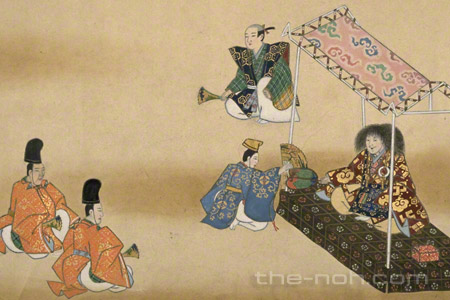
 Kantan
Kantan

![]()
Long, long ago, there was a man named Rosei in the country of Shu Han in China. He had lived his life without a particular purpose, but as he had been wondering how he should live, one day he heard about a great priest on Mount Yōhi in the land of Chu, and he left his home in order to meet the monk. On his way to Mount Yōhi, he stays at an inn in the village called Kantan. Following the advice from the mistress of the inn, Rosei decides to take a nap on a mysterious pillow, “the pillow of Kantan,” while waiting for a millet meal to be prepared. The mistress had received the pillow of Kantan from a master of the mystic Hsien art of Daoism. It was said that a person could attain enlightenment for their future, once they use the pillow.
While Rosei is taking a nap, someone comes for him. It is an imperial messenger from the emperor of Chu. He tells Rosei he was dispatched in order to deliver the message that Rosei will succeed to the throne. Although dubious about the unexpected offer, he rides in a shining litter to the palace. The magnificent, gorgeous look of the palace astounds Rosei. It is as marvellous as Paradise or the palace in the heaven.
Fifty years have passed since Rosei assumed the throne and he has fully enjoyed his prosperity. A feast is given at the palace to celebrate the fifty years of his reign. Rice wine for longevity is offered as a gift to the emperor. When dancers perform a dance in celebration, Rosei who is amused begins to dance. The days and nights and the seasons start to change quickly in front of Rosei’s eyes. Although he enjoys the kaleidoscope-like altering views at the beginning, it begins to become fragmented, and eventually everything vanishes. Then, he awakes as the mistress of the inn comes to wake him up for the millet meal. His fifty-year reign all happened only in a dream.
The fifty years of glory are just a dream which he has during a nap. And the dream is actually as short as the length of time it took to cook millet. Rosei attains the awareness that actual life in this world is as fragile as his dream. With gratitude for the pillow of Kantan that is indeed the pedagogue which he had sought, he departs for home as his need has been fulfilled.
![]()
This is a masterpiece of the Noh art since all the aspects of the performance reach a high level. The organization of its story is fine and smooth. The scenes change artfully on the stage. Characters emphasize the presence of performers. The dance is a delight to the eye. Chants and music sustain a good beat and changing tempo which are richly expressive. And the stage effects are surprising. The amusement of Noh art is condensed and expressed through these effects in this masterpiece.
Another aspect riveting your eyes to the stage is the profound theme of this piece. This piece originated from a Chinese story that became the source of the adage, “having a dream during cooking millet” or “the pillow of Kantan,” which means an empty dream. Although the age of the main character, Rosei, is unknown, he seems neither very young nor old. He must be approximately midway through his life. Rosei departs on his journey to seek his true self and, through the dream he has during the journey, he realizes a profound philosophical truth, lying in the depth of our lives. Deeply absorb yourself in the story and enjoy this piece for it will bring a refreshing sentiment to the audience after the performance. It will be something similar to what you might feel when something that is left dangling is finally settled the way it should be.
The Kantan-otoko mask is used for this performance. This mask is often used by a shite who plays a role such as young male deity. However, you will be more impressed when you see this mask in the performance of Kantan, for which the mask is originally made.
STORY PAPER : Kantan
Story Paper presents noh chant stories in modern speech, with story outlines, highlights and more using Adobe PDF format, which can print out and zoom in. Print out the pages and take them with you when you see the actual noh performance.

The copyright of Story Paper is held by the Noh.com. Story Paper is for individual use only. It is prohibited by the copyright law to distribute or publish printed-out Story Paper pages without prior consent. For more information, check the credit and disclaimer pages.



 [Kantan : Story Paper PDF : 600KB
[Kantan : Story Paper PDF : 600KB